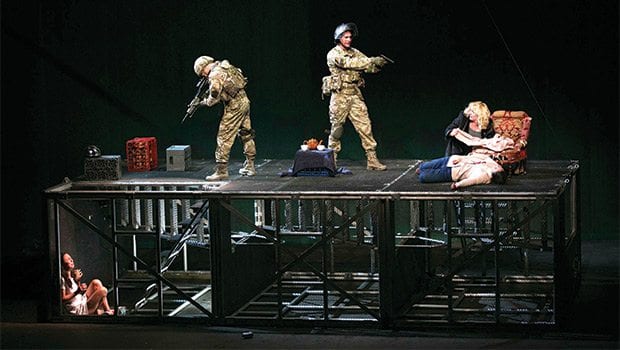
“I’m a Dublin man,” says an unarmed man to the soldier pointing a gun at his head, as if that fact should be sufficient reason for him to lower his weapon.
Instead, the soldier takes him into custody in this scene from the Abbey Theatre production of “The Plough and the Stars,” at the American Repertory Theater in Harvard Square through October 9. Written by Seán O’Casey (1880-1964), a socialist and the first prominent Irish playwright to write about Dublin’s working-class people, the play alternates between scenes of humor and anguish in its neighborhood-scale portrayal of the Easter Rising of 1916.
That bloody six-day skirmish in Dublin launched the use of violence instead of politics by Irish republicans as a means to win Ireland’s independence from Britain. Although its leaders were promptly executed and civilian casualties were heavy, the Easter Rising remains enshrined in Irish history as pivotal in establishing the Irish Free State, which became today’s Republic of Ireland.
On the web
The Abbey Theatre production of “The Plough and the Stars” https://americanrepertorytheater.org/events/show/plough-and-stars
The play’s title is drawn from the symbols on the rebel flag, a plough and the Big Dipper, a constellation that dominates the night sky in Ireland.
Just a decade after the Rising, the Abbey Theatre, Ireland’s national theater company, premiered O’Casey’s play in Dublin. The production provoked riots for its antiheroic message. O’Casey took a dim view of violence and populated the play with tenement residents whose suffering, raunchy humor and decency make them more sympathetic than the rebels and their high-minded leaders.
Marking the centennial of the Easter Rising, the company is touring with its powerful and entertaining new production, directed by Sean Holmes. Mining the irony in O’Casey’s play, its contemporary, spare staging brings O’Casey’s scathing satire up to date, evoking violence between a government and its citizens in our day — from police brutality to the civil war in Syria.
As the production opens, a girl stands alone on stage and belts out a patriotic song. She begins to cough and spits up blood on her sheet music. The curtain opens to show the entire cast, seated in everyday clothes. She joins them and together they pull out furniture and create a living room. Representing their tenement building is three-tiered scaffolding to the side of the stage.
Jon Bausor designed the versatile, expressive set, with agile lighting by Paul Keogan that darkens as daily tenement life falls apart in a city under siege. Music and sound by Philip Stewart lend a rich dimension to this production. Actors burst into song and a hypnotic recorded voice narrates passages from speeches of Pádraig Pearse, a poet and teacher who became commander of the Rising, as he proclaims that independence is worth bloodshed. Costumes by Catherine Fay vary from the muted garb of the rebels and British soldiers to the foppish plumed uniform of an old uncle who is a proud member of the Irish National Foresters, a fraternal organization with more pageantry than clout.
Running 2½ hours, including one intermission, the production seems long at times, because, at least on opening night, some speeches were difficult to understand due to the actors’ Irish accents. But all 14 members of the cast are convincing in their parts, and their robust physical acting conveys character with vivid body language.
The first two acts introduce the tenement dwellers six months before the Rising. Adding edge and distance, the actors often turn to the audience as they speak rather than face each other.
Kate Stanley Brennan and Ian-Lloyd Anderson are appealing as Nora and Jack Clitheroe, a young couple surrounded by rowdy and hard-drinking neighbors, including busybody Mrs. Gogan and Bessie Burgess, a loud and often drunk British loyalist.
A doting husband, Jack presents Nora with a stylish hat for her birthday and springs with an acrobatic leap to join her in bed. Ciarán O’Brien is also fun to watch as Young Covey, a stand-in for the playwright with his cynical view of the rebel cause. He spouts socialist jargon with mirth and zealously taunts Nora’s uncle for his plumed uniform.
Disrupting this physical comedy is a sharp knock on the door. An Irish Citizen Army soldier arrives to summon Jack, a fellow member of the rebel militia. Jack learns that he is now a senior officer. Nora confesses that she had burned the letter announcing his promotion, fearing for Jack’s life. Enraged, he heads out with the soldier.
After intermission, as the play resumes, all that is visible on the stage is the tenement house scaffolding, brightly lit against a dark stage. The structure slowly tips over, creating an image of social order also falling apart.
The Rising now is underway, and acts three and four render its impacts with a mix of comic moments and scenes of anguish. Looting lures the tenants out of hiding. Bantam-sized Young Covey is dwarfed by the washing machine on his back. Fluther Good, a likeable layabout played with warmth by David Ganly, makes amusing use of spray from a broken beer can.
The heroes in O’Casey’s play are not the soldiers like Jack who lose their lives. Instead, they are the everyday people who retain their humanity — Bessie, who sacrifices her own safety to protect the grief-maddened Nora, and Fluther Good, who defies the blackout to bury a neighbor.
The production’s concluding scene seethes with irony. Two British soldiers in search of snipers enter Bessie’s attic apartment. Seeing that the sole occupants are two women, one dead and the other deranged, they help themselves to the tea service Bessie has set out for herself and Nora. As they sip the tea, they sing “Keep the Home-Fires Burning.”






